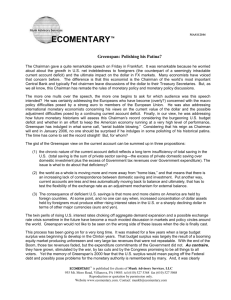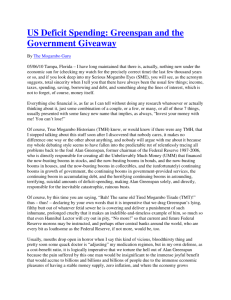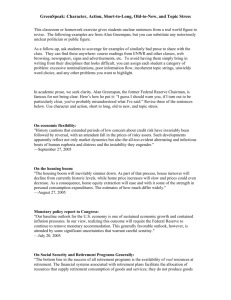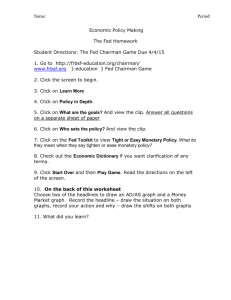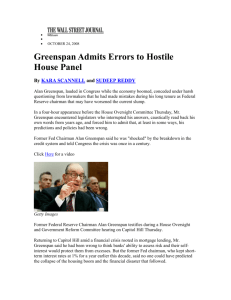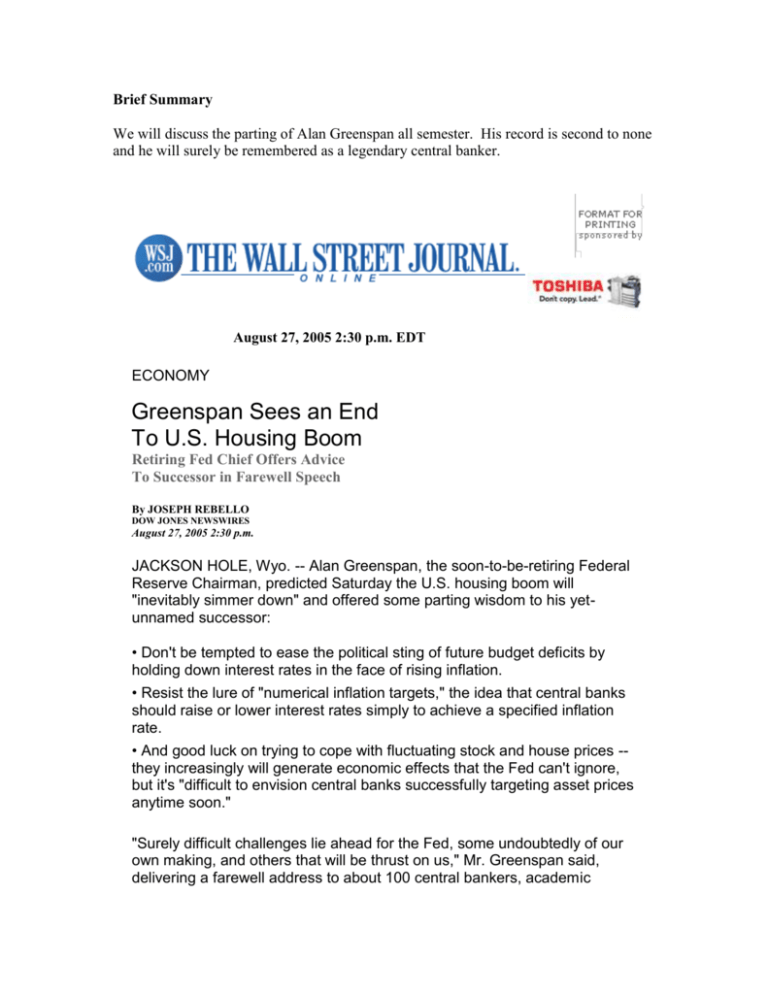
Brief Summary
We will discuss the parting of Alan Greenspan all semester. His record is second to none
and he will surely be remembered as a legendary central banker.
August 27, 2005 2:30 p.m. EDT
ECONOMY
Greenspan Sees an End
To U.S. Housing Boom
Retiring Fed Chief Offers Advice
To Successor in Farewell Speech
By JOSEPH REBELLO
DOW JONES NEWSWIRES
August 27, 2005 2:30 p.m.
JACKSON HOLE, Wyo. -- Alan Greenspan, the soon-to-be-retiring Federal
Reserve Chairman, predicted Saturday the U.S. housing boom will
"inevitably simmer down" and offered some parting wisdom to his yetunnamed successor:
• Don't be tempted to ease the political sting of future budget deficits by
holding down interest rates in the face of rising inflation.
• Resist the lure of "numerical inflation targets," the idea that central banks
should raise or lower interest rates simply to achieve a specified inflation
rate.
• And good luck on trying to cope with fluctuating stock and house prices -they increasingly will generate economic effects that the Fed can't ignore,
but it's "difficult to envision central banks successfully targeting asset prices
anytime soon."
"Surely difficult challenges lie ahead for the Fed, some undoubtedly of our
own making, and others that will be thrust on us," Mr. Greenspan said,
delivering a farewell address to about 100 central bankers, academic
economists and Wall Street investment experts at a
conference here. Still, he said, he has "little doubt" his
successor "will continue to sustain the leadership of the
American financial system in an ever widening global
economy."
Mr. Greenspan, who has been Fed chairman since
1987, presided over the longest U.S. economic
expansion in history -- a period that lasted from March
1991 to March 2001. His term expires Jan. 31, and he is
not eligible for reappointment. President Bush has said
he aims to name a successor "as good as Alan
Greenspan," but hasn't made a nomination so far.
Mr. Greenspan said coping with the end of the U.S. housing boom could be
the most immediate challenge his successor faces. "Nearer term, the
housing boom will inevitably simmer down," he said. "As part of that
process, house turnover will decline from currently historic levels, while
home-price increases will slow and prices could even decrease." Consumer
spending, he said, will weaken as homeowners slow the pace at which they
use home-equity loans to finance expenditure.
That could trigger other big economic effects. "An end to the housing boom
could induce a significant rise in the personal saving rate, a decline in
imports and a corresponding improvement in the current-account deficit,"
Mr. Greenspan said. "Whether those adjustments are wrenching will
depend ... on the degree of economic flexibility that we and our trading
partners maintain, and I hope enhance, in the years ahead."
Mr. Greenspan, who said Friday that Fed policy will be "increasingly driven
by asset-price changes" such as rises or declines in prices of stocks and
houses, clarified those views Saturday. Although Fed policy makers will be
forced to adjust monetary policy in response to the economic effects of
those changes, the central bank isn't likely to adjust interest rates in direct
response to the price changes themselves.
"The configuration of asset prices is already an integral part of our
evaluation of the large array of forces that influence financial stability and
economic growth," he said. "But given our current state of knowledge, I find
it difficult to envision central banks successfully targeting asset prices
anytime soon."
Even so, Mr. Greenspan said, "I certainly do not rule out that future work
could improve our understanding of asset-price behavior, and with it, the
conduct of monetary policy."
Mr. Greenspan, who is accused by his critics of lending crucial support to
Bush's tax-cut plan in 2001, began his farewell remarks Saturday with a
warning to his successor not to let politics get in the way of monetary policy.
After the tax cuts were enacted, the U.S. budget balance swung from
surpluses to record deficits. Those deficits are expected to persist into the
next decade, economists say, and could grow larger as more Baby
Boomers retire.
Mr. Greenspan said the Fed shouldn't hesitate to raise interest rates if
future budget deficits end up fanning inflation. "Monetary policy ... cannot
ignore the potential inflationary pressures inherent in our current fiscal
outlook, especially those that could arise in meeting commitments to future
retirees," he said.
"I assume that these imbalances will be resolved before stark choices again
confront us and that, if they are not, the Fed would resist any temptation to
monetize future fiscal deficits," Mr. Greenspan said.
In the late 1960s, when the Vietnam War generated big budget deficits and
rising inflation, the Fed was slow to respond with interest-rate increases.
That, economists say, led to a combination of high inflation and slow
economic growth during the 1970s.
"We had too much experience with the dangers of inflation in the 1970s to
tolerate going through another bout of dispiriting stagflation," Mr. Greenspan
said. "The consequences for both future workers and retirees could be
daunting."
The Fed chief also took the opportunity Saturday to reiterate his opposition
to inflation-targeting. Many economists, including several attending the
conference here, have argued that Greenspan's departure makes such
targeting necessary. Mr. Greenspan, they say, conducted monetary policy
without formal rules -- but few other policy makers are likely to be endowed
with his skills. Accordingly, rules are necessary.
Mr. Greenspan disagreed. "I envision a continuous refinement of our riskmanagement paradigm," a seat-of-the-pants approach that he has said is
responsible for the Fed's success over the past 18 years. "To date, we have
chosen not to formulate explicit inflation targets, in part out of concern that
they would inhibit the effective pursuit of our goal," he said.
"I remain unpersuaded that explicit numerical inflation targets are a key
characteristic that distinguishes behavior among the world's central banks,"
he said. "The Federal Reserve and most other central banks generally
pursue price stability and, consistent with that goal, ease when economic
conditions soften, and tighten when they firm."
Write to Joseph Rebello at joseph.rebello@dowjones.com1
URL for this article:
http://online.wsj.com/article/0,,SB112516521440424773,00.html
Hyperlinks in this Article:
(1) mailto:joseph.rebello@dowjones.com
Copyright 2005 Dow Jones & Company, Inc. All Rights Reserved
This copy is for your personal, non-commercial use only. Distribution and use of this
material are governed by our Subscriber Agreement and by copyright law. For nonpersonal use or to order multiple copies, please contact Dow Jones Reprints at 1-800843-0008 or visit www.djreprints.com.
August 26, 2005 11:00 a.m. EDT
ECONOMY
Blinder Hails Greenspan Era,
But With Some Reservations
By JOSEPH REBELLO
DOW JONES NEWSWIRES
August 26, 2005 11:00 a.m.
JACKSON HOLE, Wyo. -- A former Federal Reserve vice chairman who
quit his job after less than two years amid clashes with Alan Greenspan in
the mid-1990s on Friday hailed the soon-to-be-retiring Fed chief as the
"greatest central banker who ever lived."
In a 93-page report on Greenspan's record at the Fed, Alan Blinder, now an
economics professor at Princeton University, defended the Fed chairman
against almost every substantive criticism that has been leveled against him
over the last 18 years. He called Mr. Greenspan's performance "impressive,
encompassing and overwhelmingly beneficial -- to the nation, to the
institution, and to the practice of monetary policy."
Even so, Mr. Greenspan's legacy contains two "genuine negatives" that
could hurt the Fed in the future, Mr. Blinder said at a conference of central
bankers: Greenspan presided over "the extreme personalization of
monetary policy" that made his ideas inseparable from those of the Fed. Mr.
Greenspan, Mr. Blinder said, also tended to thrust himself into the "political
maelstrom" by serving as "the nation's unofficial economic wise man -- on
just about any subject."
"The coming replacement of Alan Greenspan by a mere mortal in January
2006 will not ... be like changing dentists," Mr. Blinder said at the
conference on Mr. Greenspan's legacy. "It may in fact prove to be a
traumatic experience for the markets. We will soon learn whether the
Greenspan era has created a deep reservoir of faith in the Federal Reserve,
or just in Alan Greenspan."
Mr. Greenspan's current term at the Fed ends Jan. 31, and he is not eligible
for reappointment. President Bush has said he expects to find "a suitable
replacement, hopefully somebody as good as Alan Greenspan -- although
that will be hard to do." The White House hasn't yet publicly identified a
replacement, but Mr. Bush's top economic adviser, Ben Bernanke, is
considered a leading contender. So are Glenn Hubbard, a key architect of
Bush's tax policies who now teaches at Columbia University; and Martin
Feldstein, a Harvard University professor.
Mr. Blinder served as Fed vice chairman from 1994 to 1996, when he was
considered a top candidate to replace Mr. Greenspan. But he clashed with
the Fed chairman and left in frustration, according to the book "Maestro" by
Bob Woodward. "He concluded that Greenspan was not a straight person,
not open and direct in the way that Blinder expected of colleagues. He had
just wanted to be part of the interest rate game, and Greenspan had not
permitted it," Mr. Woodward wrote.
But in his report Friday, Mr. Blinder strongly defended Mr. Greenspan's
work as Fed chairman. He rejected five leading criticisms -- including the
charge that Mr. Greenspan gave up his "anti-bubble rhetoric too easily"
after his famous speech about "irrational exuberance" among investors
generated complaints from U.S. lawmakers. Mr. Blinder also said Mr.
Greenspan can't be faulted on the grounds that he waited too long to raise
interest rates, or increase margin requirements for stock investments.
Nor did the so-called "Greenspan put" -- the belief in financial markets that
Mr. Greenspan would readily cut interest rates if asset prices fell too far -encourage "excessive risk-taking," Mr. Blinder said. Mr. Greenspan, he
said, "did a little more cheerleading than he should have" regarding
changes in the structure of the economy that he said made it less prone to
inflation. But Mr. Greenspan's "New Economy" cheerleading, Mr. Blinder
said, amounted to "a minor misdemeanor, at worst; certainly not a felony."
Still, Mr. Blinder said, the "cult of personality" that emerged around Mr.
Greenspan could be a long-term liability for the Fed. Mr. Blinder said his
own research has shown that monetary policy drafted by a committee tends
to be "less volatile" and promotes "better decisions" than policy formulated
by an individual. Although Mr. Greenspan's policies may have been
beneficial for the nation, he said, it isn't certain his replacement will be as
successful.
"Can President Bush pull off the trick that President Reagan apparently did
in 1987?" Mr. Blinder asked, referring to Mr. Reagan's decision to appoint
Mr. Greenspan as Fed Chairman. "It's not impossible. The Yankees
managed to replace Joe DiMaggio in centerfield by Mickey Mantle in 1951.
But no Yankee centerfielder has approached that standard since."
"So our view is that the (Fed's monetary-policy committee) would be wise to
function more like a true committee -- albeit with one clear leader -- in the
future than it has in the past," Mr. Blinder said. "And that, of course, would
directly contradict one notable aspect of the Greenspan legacy."
Mr. Blinder also faulted Mr. Greenspan for publicly offering opinions on
matters outside the scope of monetary policy. "We believe there are several
things wrong with Greenspan's penchant for offering his opinion on just
about any economic issue, even if the issue is politically charged." Such
opinions may have hurt public perceptions of the Fed as a "truly
independent central bank," Mr. Blinder said.
"Greenspan's outspoken views in support of the Bush tax cuts in 2001 and
partial privatization of Social Security in 2005 are two prominent cases in
point," Mr. Blinder said. "They have made him a partisan figure in the eyes
of many. And that, in turn, may account for the sharp decline in the number
of Americans who tell the Gallup poll that they have either "a great deal" or
"a fair amount" of confidence in him "to do or recommend the right thing for
the economy.'"
Moreover, such views could spur Congress to meddle in the affairs of the
Fed, Mr. Blinder said. "When the Fed poaches into political territory, it
invites Congress to reciprocate," he said. "As Congressman Rahm Emanuel
(D., Ill.) recently told the Washington Post in criticizing Greenspan, 'There's
a moat around the Fed that says he doesn't get involved in political
discussions. He took the moat down.'"
Write to Joseph Rebello at joseph.rebello@dowjones.com1
URL for this article:
http://online.wsj.com/article/0,,SB112506733853924183,00.html
Hyperlinks in this Article:
(1) mailto:joseph.rebello@dowjones.com
Copyright 2005 Dow Jones & Company, Inc. All Rights Reserved
This copy is for your personal, non-commercial use only. Distribution and use of this
material are governed by our Subscriber Agreement and by copyright law. For nonpersonal use or to order multiple copies, please contact Dow Jones Reprints at 1-800843-0008 or visit www.djreprints.com.



